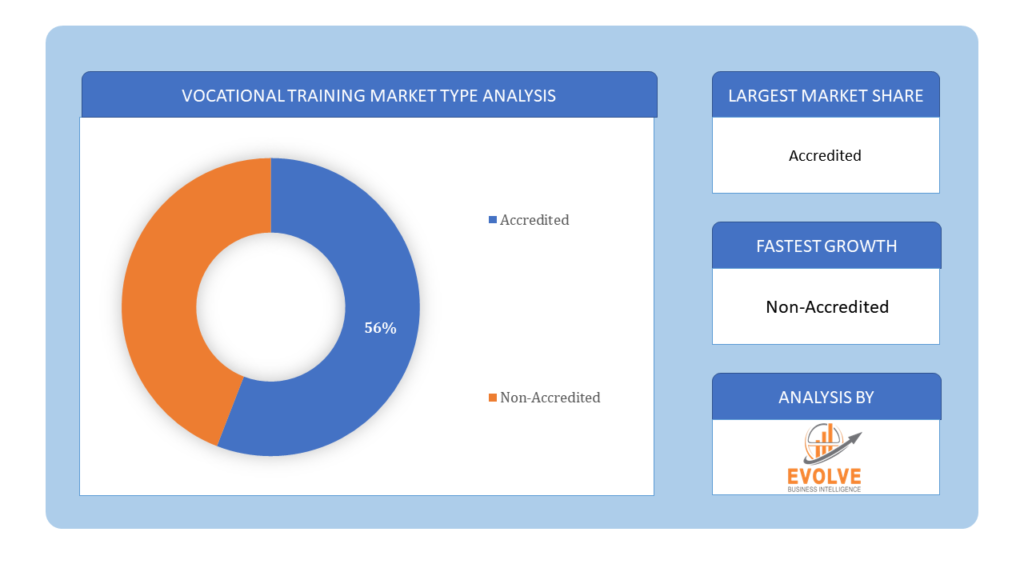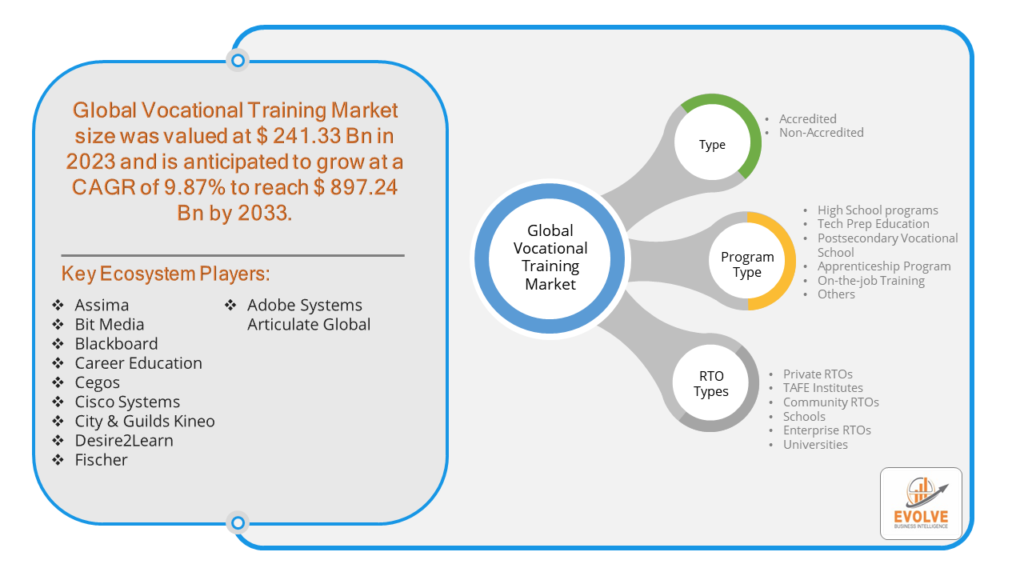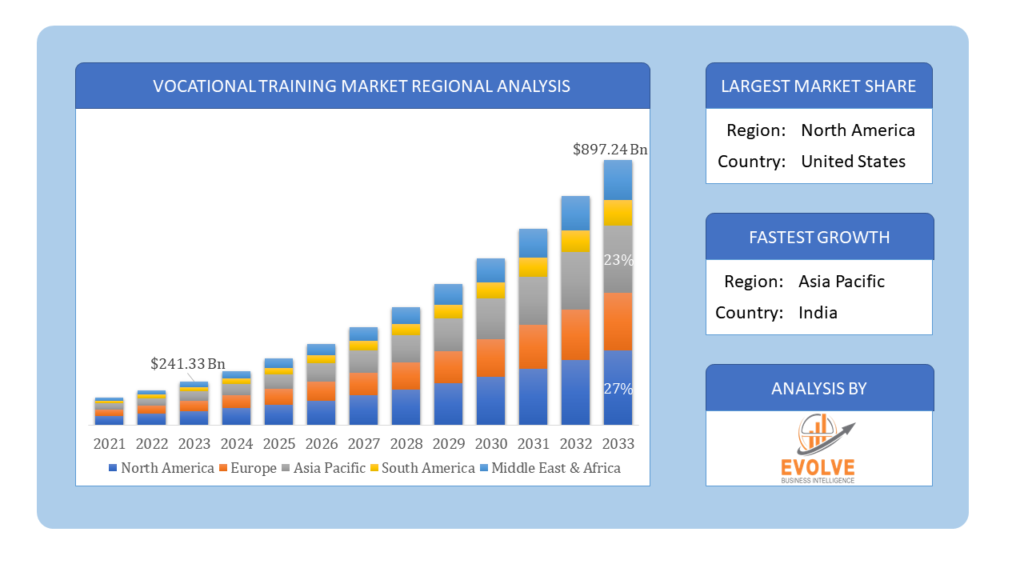Vocational Training Market Analysis and Global Forecast 2023-2033
$ 1,390.00 – $ 5,520.00Price range: $ 1,390.00 through $ 5,520.00
Vocational Training Market Research Report: Information By Type (Accredited, Non-Accredited), By Program Type (High School programs, Tech Prep Education, Postsecondary Vocational School, Apprenticeship Program, On-the-job Training, Others), By RTO Types (Private RTOs, TAFE Institutes, Community RTOs, Schools, Enterprise RTOs, Universities), and by Region — Forecast till 2033
Page: 158
Vocational Training Market Overview
The Vocational Training Market Size is expected to reach USD 897.24 Billion by 2033. The Vocational Training Market industry size accounted for USD 241.33 Billion in 2023 and is expected to expand at a compound annual growth rate (CAGR) of 9.87% from 2023 to 2033. The Vocational Training Market, also referred to as the Technical and Vocational Education and Training (TVET) market, is the economic sector encompassing the services, resources, and programs designed to equip individuals with the skills and knowledge needed for specific technical or vocational careers. The Vocational Training Market is crucial for bridging the gap between theoretical knowledge and real-world application in the job market.
Key factors influencing the Vocational Training Market include technological advancements, industry demand for skilled labor, government policies promoting vocational education, and the need for continuous professional development.
Global Vocational Training Market Synopsis
The COVID-19 pandemic significantly impacted the Vocational Training Market. With lockdowns and social distancing measures in place, many vocational training institutions and programs moved online. This accelerated the adoption of digital platforms and e-learning tools. The pandemic highlighted the need for specific skills, particularly in healthcare, IT, and logistics. Vocational training programs adapted to meet these new demands by developing targeted courses. Financial constraints for both individuals and institutions resulted in reduced enrollment and budget cuts. Some training providers faced closures or had to downsize. The crisis spurred innovation in training methods, including virtual simulations, augmented reality (AR), and virtual reality (VR) for practical training.
Vocational Training Market Dynamics
The major factors that have impacted the growth of Vocational Training Market are as follows:
Drivers:
Ø Technological Advancements
Rapid technological changes require continuous upskilling and reskilling. Vocational training programs help workers keep pace with new technologies and industry practices. As economies grow, the demand for skilled labor increases, boosting the need for vocational training to support various sectors such as healthcare, IT, manufacturing, and services. Growing recognition of the value of vocational training as a viable alternative to traditional academic education contributes to its popularity. Companies invest in vocational training programs to develop their workforce, improve productivity, and retain talent by providing opportunities for career advancement. Globalization leads to increased competition and the need for a skilled workforce that can meet international standards, further driving the demand for vocational training.
Restraint:
- Perception of High Costs
The cost of vocational training programs can be prohibitive for many individuals, especially in developing countries where access to financial aid and scholarships is limited. There is often a lack of awareness about the benefits of vocational training. Additionally, vocational education is sometimes perceived as less prestigious compared to traditional academic education, which can deter potential students. The absence of standardized curricula and quality assurance mechanisms can lead to varying levels of training quality, affecting the credibility and recognition of vocational qualifications.
Opportunity:
⮚ Growing demand for Digital Transformation and E-Learning
The rise of digital platforms and online learning technologies provides an opportunity to deliver vocational training to a broader audience. E-learning can overcome geographical barriers and make training more accessible and flexible. Increased government investment and supportive policies for vocational education can enhance the infrastructure and quality of training programs, expanding their reach and impact. Promoting lifelong learning and continuous professional development can drive demand for vocational training as individuals seek to update their skills and advance their careers throughout their lives.
Vocational Training Market Segment Overview
By Type
 Based on Type, the market is segmented based on Accredited and Non-Accredited. The Accredited segment dominant the market. Accredited programs are evaluated and continuously monitored to ensure they meet established standards for curriculum, faculty qualifications, facilities, and student outcomes. Accredited training programs are widely recognized and respected by employers, industry associations, and other educational institutions, enhancing the employability of graduates.
Based on Type, the market is segmented based on Accredited and Non-Accredited. The Accredited segment dominant the market. Accredited programs are evaluated and continuously monitored to ensure they meet established standards for curriculum, faculty qualifications, facilities, and student outcomes. Accredited training programs are widely recognized and respected by employers, industry associations, and other educational institutions, enhancing the employability of graduates.
By Program Type
Based on Program Type, the market segment has been divided into the High School programs, Tech Prep Education, Postsecondary Vocational School, Apprenticeship Program, On-the-job Training and Others. Apprenticeships involve a significant portion of training taking place in the workplace, providing real-world experience. Apprentices work under the guidance of experienced mentors or journeymen who provide hands-on training and supervision.
By RTO Types
Based on RTO Types, the market segment has been divided into the Private RTOs, TAFE Institutes, Community RTOs, Schools, Enterprise RTOs and Universities. TAFE institutes offer a broad spectrum of courses, ranging from certificate to advanced diploma levels, in fields such as healthcare, business, engineering, hospitality, IT, and creative arts. TAFE institutes provide flexible study options, including full-time, part-time, online, and blended learning modes, catering to diverse student needs.
Global Vocational Training Market Regional Analysis
Based on region, the global Vocational Training Market has been divided into North America, Europe, Asia-Pacific, the Middle East & Africa, and Latin America. North America is projected to dominate the use of the Vocational Training Market followed by the Asia-Pacific and Europe regions.
 Vocational Training North America Market
Vocational Training North America Market
North America holds a dominant position in the Vocational Training Market. High demand for skilled labor in technology, healthcare, and manufacturing sectors; strong government support for vocational training programs. Growth of online learning platforms, corporate training initiatives, and integration of advanced technologies like VR and AR. High costs of training programs and varying state-level regulations.
Vocational Training Asia-Pacific Market
The Asia-Pacific region has indeed emerged as the fastest-growing market for the Vocational Training Market industry. Rapid economic growth, urbanization, and industrialization driving demand for skilled labor; government initiatives promoting vocational education. Large population base, increasing adoption of digital learning tools, and significant investment in educational infrastructure. Varied levels of infrastructure development and quality of training across countries, cultural perceptions favoring traditional academic education.
Competitive Landscape
The global Vocational Training Market is highly competitive, with numerous players offering a wide range of software solutions. The competitive landscape is characterized by the presence of established companies, as well as emerging startups and niche players. To increase their market position and attract a wide consumer base, the businesses are employing various strategies, such as product launches, and strategic alliances.
Prominent Players:
- Assima
- Bit Media
- Blackboard
- Career Education
- Cegos
- Cisco Systems
- City & Guilds Kineo
- Desire2Learn
- Fischer
- Adobe Systems Articulate Global
Key Development
In 5th April, 2022 The Cegos Group, the European leader in Learning and Development and one of the world’s leading providers in the sector, announces the acquisition of Next Group, which focuses on professional reskilling for individuals and on work-linked higher education. With this acquisition, which further strengthens its leadership position, Cegos is accelerating its development in the BtoC segment and consolidating its position in the professional reskilling market.
Scope of the Report
Global Vocational Training Market, by Type
- Accredited
- Non-Accredited
Global Vocational Training Market, by Program Type
- High School programs
- Tech Prep Education
- Postsecondary Vocational School
- Apprenticeship Program
- On-the-job Training
- Others
Global Vocational Training Market, by RTO Types
- Private RTOs
- TAFE Institutes
- Community RTOs
- Schools
- Enterprise RTOs
- Universities
Global Vocational Training Market, by Region
- North America
- US
- Canada
- Mexico
- Europe
- UK
- Germany
- France
- Italy
- Spain
- Benelux
- Nordic
- Rest of Europe
- Asia Pacific
- China
- Japan
- South Korea
- Indonesia
- Austalia
- Malaysia
- India
- Rest of Asia Pacific
- South America
- Brazil
- Argentina
- Rest of South America
- Middle East & Africa
- Saudi Arabia
- UAE
- Egypt
- South Africa
- Rest of Middle East & Africa
| Parameters | Indicators |
|---|---|
| Market Size | 2033: $897.24 Billion/strong> |
| CAGR | 9.87% CAGR (2023-2033) |
| Base year | 2022 |
| Forecast Period | 2023-2033 |
| Historical Data | 2021 |
| Report Coverage | Revenue Forecast, Competitive Landscape, Growth Factors, and Trends |
| Key Segmentations | Type, Program Type, RTO Types |
| Geographies Covered | North America, Europe, Asia-Pacific, Latin America, Middle East, Africa |
| Key Vendors | Assima, Bit Media, Blackboard, Career Education, Cegos, Cisco Systems, City & Guilds Kineo, Desire2Learn, Fischer and Adobe Systems Articulate Global |
| Key Market Opportunities | • The growing demand for Digital Transformation and E-Learning • Lifelong Learning Initiatives |
| Key Market Drivers | • Technological Advancements • Increasing Awareness of Vocational Education |
REPORT CONTENT BRIEF:
- High-level analysis of the current and future Vocational Training Market trends and opportunities
- Detailed analysis of current market drivers, restraining factors, and opportunities in the future
- Vocational Training Market historical market size for the year 2021, and forecast from 2023 to 2033
- Vocational Training Market share analysis at each product level
- Competitor analysis with detailed insight into its product segment, Government & Defense strength, and strategies adopted.
- Identifies key strategies adopted including product launches and developments, mergers and acquisitions, joint ventures, collaborations, and partnerships as well as funding taken and investment done, among others.
- To identify and understand the various factors involved in the global Vocational Training Market affected by the pandemic
- To provide a detailed insight into the major companies operating in the market. The profiling will include the Government & Defense health of the company’s past 2-3 years with segmental and regional revenue breakup, product offering, recent developments, SWOT analysis, and key strategies.
Press Release

Global Pharmaceutical Manufacturing Market to Reach $1.38 Trillion by 2035 with 7.35% CAGR, New Research Shows

The Global Mammography Market Is Estimated To Record a CAGR of Around 10.29% During The Forecast Period

Glue Stick Market to Reach USD 2.35 Billion by 2034

Podiatry Service Market to Reach USD 11.88 Billion by 2034

Microfluidics Technology Market to Reach USD 32.58 Billion by 2034

Ferric Chloride Market to Reach USD 10.65 Billion by 2034

Family Practice EMR Software Market to Reach USD 21.52 Billion by 2034

Electric Hairbrush Market to Reach USD 15.95 Billion by 2034

Daily Bamboo Products Market to Reach USD 143.52 Billion by 2034

Cross-border E-commerce Logistics Market to Reach USD 112.65 Billion by 2034
Frequently Asked Questions (FAQ)
1.What is the study period of this market?
- The study period of the global Vocational Training Market is 2021- 2033
2.What is the growth rate of the global Vocational Training Market?
- The global Vocational Training Market is growing at a CAGR of 9.87% over the next 10 years
3.Which region has the highest growth rate in the market of Vocational Training Market?
- Asia Pacific is expected to register the highest CAGR during 2023-2033
4.Which region has the largest share of the global Vocational Training Market?
- North America holds the largest share in 2022
5.Who are the key players in the global Vocational Training Market?
Assima, Bit Media, Blackboard, Career Education, Cegos, Cisco Systems, City & Guilds Kineo, Desire2Learn, Fischer and Adobe Systems Articulate Global. are the major companies operating in the market
6.Do you offer Post Sale Support?
- Yes, we offer 16 hours of analyst support to solve the queries
7.Do you sell particular sections of a report?
Yes, we provide regional as well as country-level reports. Other than this we also provide a sectional report. Please get in contact with our sales representatives
Table of Content
CHAPTER 1. Executive Summary CHAPTER 2. Scope of the Study 2.1. Market Definition 2.2. Market Scope & Segmentation 2.2.1. Objective of Report CHAPTER 3. Evolve BI Methodology 3.1. Data Collection & Validation Approach 3.2. Market Size Estimation and Forecast CHAPTER 4. Exclusive Analysis 4.1. Market Opportunity Score 4.1.1. Type Segement – Market Opportunity Score 4.1.2. Program Type Segment – Market Opportunity Score 4.1.3. RTO Type Segment – Market Opportunity Score 4.2. Key Market Influencing Indicators CHAPTER 5. Market Insights and Trends 5.1. Value Chain Analysis 5.1.1. Raw Material 5.1.2. Manufacturing Process 5.1.3. Distribution Channel 5.1.4. End User 5.2. Porter’s Five Forces Analysis 5.2.1. Bargaining Power of Buyers 5.2.2. Bargaining Power of Suppliers 5.2.3. Threat of New Entrant 5.2.4. Threat of Substitute 5.2.5. Industry Rivalry 5.3. COVID-19 Impact and Post COVID Scenario on Vocational Training Market 5.3.1. Impact of COVID-19 5.3.2. Government Support and Industry Revival Policies 5.3.3. Measures Taken by Companies to Mitigate Negative Impact 5.3.4. Post COVID Trend CHAPTER 6. Market Dynamics 6.1. Introduction 6.2. Drivers 6.2.1. Driver 1 6.2.2. Driver 2 6.2.3. Driver 3 6.3. Restraints 6.3.1. Restraint 1 6.3.2. Restraint 2 6.4. Opportunity 6.4.1. Opportunity 1 CHAPTER 7. Vocational Training Market, By Type 7.1. Introduction 7.1.1. Accredited 7.1.2. Non-Accredited CHAPTER 8. Vocational Training Market, By Program Type 8.1. Introduction 8.1.1. High School programs 8.1.2. Tech Prep Education 8.1.3 Postsecondary Vocational School 8.1.4 Apprenticeship Program 8.1.5 On-the-job Training 8.1.6 Others CHAPTER 9. Vocational Training Market, By RTO Type 9.1. Introduction 9.1.1. Private RTOs 9.1.2 TAFE Institutes 9.1.3 Community RTOs 9.1.4 Schools 9.1.5 Enterprise RTOs 9.1.6 Universities CHAPTER 10. Vocational Training Market, By Region 10.1. Introduction 10.2. NORTH AMERICA 10.2.1. North America: Market Size and Forecast, By Country, 2023 – 2033 ($ Million) 10.2.2. North America: Market Size and Forecast, By Type, 2023 – 2033 ($ Million) 10.2.3. North America: Market Size and Forecast, By Program Type, 2023 – 2033 ($ Million) 10.2.4. North America: Market Size and Forecast, By RTO Type, 2023 – 2033 ($ Million) 10.2.5. US 10.2.5.1. US: Market Size and Forecast, By Type, 2023 – 2033 ($ Million) 10.2.5.2. US: Market Size and Forecast, By Program Type, 2023 – 2033 ($ Million) 10.2.5.3. US: Market Size and Forecast, By RTO Type, 2023 – 2033 ($ Million) 10.2.6. CANADA 10.2.6.1. Canada: Market Size and Forecast, By Type, 2023 – 2033 ($ Million) 10.2.6.2. Canada: Market Size and Forecast, By Program Type, 2023 – 2033 ($ Million) 10.2.6.3. Canada: Market Size and Forecast, By RTO Type, 2023 – 2033 ($ Million) 10.2.7. MEXICO 10.2.7.1. Mexico: Market Size and Forecast, By Type, 2023 – 2033 ($ Million) 10.2.7.2. Mexico: Market Size and Forecast, By Program Type, 2023 – 2033 ($ Million) 10.2.7.3. Mexico: Market Size and Forecast, By RTO Type, 2023 – 2033 ($ Million) 10.3. Europe 10.3.1. Europe: Market Size and Forecast, By Country, 2023 – 2033 ($ Million) 10.3.2. Europe: Market Size and Forecast, By Type, 2023 – 2033 ($ Million) 10.3.3. Europe: Market Size and Forecast, By Program Type, 2023 – 2033 ($ Million) 10.3.4. Europe: Market Size and Forecast, By RTO Type, 2023 – 2033 ($ Million) 10.3.5. U.K. 10.3.5.1. U.K.: Market Size and Forecast, By Type, 2023 – 2033 ($ Million) 10.3.5.2. U.K.: Market Size and Forecast, By Program Type, 2023 – 2033 ($ Million) 10.3.5.3. U.K.: Market Size and Forecast, By RTO Type, 2023 – 2033 ($ Million) 10.3.6. GERMANY 10.3.6.1. Germany: Market Size and Forecast, By Type, 2023 – 2033 ($ Million) 10.3.6.2. Germany: Market Size and Forecast, By Program Type, 2023 – 2033 ($ Million) 10.3.6.3. Germany: Market Size and Forecast, By RTO Type, 2023 – 2033 ($ Million) 10.3.7. FRANCE 10.3.7.1. France: Market Size and Forecast, By Type, 2023 – 2033 ($ Million) 10.3.7.2. France: Market Size and Forecast, By Program Type, 2023 – 2033 ($ Million) 10.3.7.3. France: Market Size and Forecast, By RTO Type, 2023 – 2033 ($ Million) 10.3.8. ITALY 10.3.8.1. Italy: Market Size and Forecast, By Type, 2023 – 2033 ($ Million) 10.3.8.2. Italy: Market Size and Forecast, By Program Type, 2023 – 2033 ($ Million) 10.3.8.3. Italy: Market Size and Forecast, By RTO Type, 2023 – 2033 ($ Million) 10.3.9. SPAIN 10.3.9.1. Spain: Market Size and Forecast, By Type, 2023 – 2033 ($ Million) 10.3.9.2. Spain: Market Size and Forecast, By Program Type, 2023 – 2033 ($ Million) 10.3.9.3. Spain: Market Size and Forecast, By RTO Type, 2023 – 2033 ($ Million) 10.3.10. BENELUX 10.3.10.1. BeNeLux: Market Size and Forecast, By Type, 2023 – 2033 ($ Million) 10.3.10.2. BeNeLux: Market Size and Forecast, By Program Type, 2023 – 2033 ($ Million) 10.3.10.3. BeNeLux: Market Size and Forecast, By RTO Type, 2023 – 2033 ($ Million) 10.3.11. RUSSIA 10.3.11.1. Russia: Market Size and Forecast, By Type, 2023 – 2033 ($ Million) 10.3.11.2. Russia: Market Size and Forecast, By Program Type, 2023 – 2033 ($ Million) 10.3.11.3. Russia: Market Size and Forecast, By RTO Type, 2023 – 2033 ($ Million) 10.3.12. REST OF EUROPE 10.3.12.1. Rest of Europe: Market Size and Forecast, By Type, 2023 – 2033 ($ Million) 10.3.12.2. Rest of Europe: Market Size and Forecast, By Program Type, 2023 – 2033 ($ Million) 10.3.12.3. Rest of Europe: Market Size and Forecast, By RTO Type, 2023 – 2033 ($ Million) 10.4. Asia Pacific 10.4.1. Asia Pacific: Market Size and Forecast, By Country, 2023 – 2033 ($ Million) 10.4.2. Asia Pacific: Market Size and Forecast, By Type, 2023 – 2033 ($ Million) 10.4.3. Asia Pacific: Market Size and Forecast, By Program Type, 2023 – 2033 ($ Million) 10.4.4. Asia Pacific: Market Size and Forecast, By RTO Type, 2023 – 2033 ($ Million) 10.4.5. CHINA 10.4.5.1. China: Market Size and Forecast, By Type, 2023 – 2033 ($ Million) 10.4.5.2. China: Market Size and Forecast, By Program Type, 2023 – 2033 ($ Million) 10.4.5.3. China: Market Size and Forecast, By RTO Type, 2023 – 2033 ($ Million) 10.4.6. JAPAN 10.4.6.1. Japan: Market Size and Forecast, By Type, 2023 – 2033 ($ Million) 10.4.6.2. Japan: Market Size and Forecast, By Program Type, 2023 – 2033 ($ Million) 10.4.6.3. Japan: Market Size and Forecast, By RTO Type, 2023 – 2033 ($ Million) 10.4.7. INDIA 10.4.7.1. India: Market Size and Forecast, By Type, 2023 – 2033 ($ Million) 10.4.7.2. India: Market Size and Forecast, By Program Type, 2023 – 2033 ($ Million) 10.4.7.3. India: Market Size and Forecast, By RTO Type, 2023 – 2033 ($ Million) 10.4.8. SOUTH KOREA 10.4.8.1. South Korea: Market Size and Forecast, By Type, 2023 – 2033 ($ Million) 10.4.8.2. South Korea: Market Size and Forecast, By Program Type, 2023 – 2033 ($ Million) 10.4.8.3. South Korea: Market Size and Forecast, By RTO Type, 2023 – 2033 ($ Million) 10.4.9. THAILAND 10.4.9.1. Thailand: Market Size and Forecast, By Type, 2023 – 2033 ($ Million) 10.4.9.2. Thailand: Market Size and Forecast, By Program Type, 2023 – 2033 ($ Million) 10.4.9.3. Thailand: Market Size and Forecast, By RTO Type, 2023 – 2033 ($ Million) 10.4.10. INDONESIA 10.4.10.1. Indonesia: Market Size and Forecast, By Type, 2023 – 2033 ($ Million) 10.4.10.2. Indonesia: Market Size and Forecast, By Program Type, 2023 – 2033 ($ Million) 10.4.10.3. Indonesia: Market Size and Forecast, By RTO Type, 2023 – 2033 ($ Million) 10.4.11. MALAYSIA 10.4.11.1. Malaysia: Market Size and Forecast, By Type, 2023 – 2033 ($ Million) 10.4.11.2. Malaysia: Market Size and Forecast, By Program Type, 2023 – 2033 ($ Million) 10.4.11.3. Malaysia: Market Size and Forecast, By RTO Type, 2023 – 2033 ($ Million) 10.4.12. AUSTRALIA 10.4.12.1. Australia: Market Size and Forecast, By Type, 2023 – 2033 ($ Million) 10.4.12.2. Australia: Market Size and Forecast, By Program Type, 2023 – 2033 ($ Million) 10.4.12.3. Australia: Market Size and Forecast, By RTO Type, 2023 – 2033 ($ Million) 10.4.13. REST FO ASIA PACIFIC 10.4.13.1. Rest fo Asia Pacific: Market Size and Forecast, By Type, 2023 – 2033 ($ Million) 10.4.13.2. Rest fo Asia Pacific: Market Size and Forecast, By Program Type, 2023 – 2033 ($ Million) 10.4.13.3. Rest fo Asia Pacific: Market Size and Forecast, By RTO Type, 2023 – 2033 ($ Million) 10.5. South America 10.5.1. South America: Market Size and Forecast, By Country, 2023 – 2033 ($ Million) 10.5.2. South America: Market Size and Forecast, By Type, 2023 – 2033 ($ Million) 10.5.3. South America: Market Size and Forecast, By Program Type, 2023 – 2033 ($ Million) 10.5.4. South America: Market Size and Forecast, By RTO Type, 2023 – 2033 ($ Million) 10.5.5. BRAZIL 10.5.5.1. Brazil: Market Size and Forecast, By Type, 2023 – 2033 ($ Million) 10.5.5.2. Brazil: Market Size and Forecast, By Program Type, 2023 – 2033 ($ Million) 10.5.5.3. Brazil: Market Size and Forecast, By RTO Type, 2023 – 2033 ($ Million) 10.5.6. ARGENTINA 10.5.6.1. Argentina: Market Size and Forecast, By Type, 2023 – 2033 ($ Million) 10.5.6.2. Argentina: Market Size and Forecast, By Program Type, 2023 – 2033 ($ Million) 10.5.6.3. Argentina: Market Size and Forecast, By RTO Type, 2023 – 2033 ($ Million) 10.5.7. REST OF SOUTH AMERICA 10.5.7.1. Rest of South America: Market Size and Forecast, By Type, 2023 – 2033 ($ Million) 10.5.7.2. Rest of South America: Market Size and Forecast, By Program Type, 2023 – 2033 ($ Million) 10.5.7.3. Rest of South America: Market Size and Forecast, By RTO Type, 2023 – 2033 ($ Million) 10.6. Middle East & Africa 10.6.1. Middle East & Africa: Market Size and Forecast, By Country, 2023 – 2033 ($ Million) 10.6.2. Middle East & Africa: Market Size and Forecast, By Type, 2023 – 2033 ($ Million) 10.6.3. Middle East & Africa: Market Size and Forecast, By Program Type, 2023 – 2033 ($ Million) 10.6.4. Middle East & Africa: Market Size and Forecast, By RTO Type, 2023 – 2033 ($ Million) 10.6.5. SAUDI ARABIA 10.6.5.1. Saudi Arabia: Market Size and Forecast, By Type, 2023 – 2033 ($ Million) 10.6.5.2. Saudi Arabia: Market Size and Forecast, By Program Type, 2023 – 2033 ($ Million) 10.6.5.3. Saudi Arabia: Market Size and Forecast, By RTO Type, 2023 – 2033 ($ Million) 10.6.6. UAE 10.6.6.1. UAE: Market Size and Forecast, By Type, 2023 – 2033 ($ Million) 10.6.6.2. UAE: Market Size and Forecast, By Program Type, 2023 – 2033 ($ Million) 10.6.6.3. UAE: Market Size and Forecast, By RTO Type, 2023 – 2033 ($ Million) 10.6.7. EGYPT 10.6.7.1. Egypt: Market Size and Forecast, By Type, 2023 – 2033 ($ Million) 10.6.7.2. Egypt: Market Size and Forecast, By Program Type, 2023 – 2033 ($ Million) 10.6.7.3. Egypt: Market Size and Forecast, By RTO Type, 2023 – 2033 ($ Million) 10.6.8. SOUTH AFRICA 10.6.8.1. South Africa: Market Size and Forecast, By Type, 2023 – 2033 ($ Million) 10.6.8.2. South Africa: Market Size and Forecast, By Program Type, 2023 – 2033 ($ Million) 10.6.8.3. South Africa: Market Size and Forecast, By RTO Type, 2023 – 2033 ($ Million) 10.6.9. REST OF MIDDLE EAST & AFRICA 10.6.9.1. Rest of Middle East & Africa: Market Size and Forecast, By Type, 2023 – 2033 ($ Million) 10.6.9.2.____ Rest of Middle East & Africa: Market Size and Forecast, By Program Type, 2023 – 2033 ($ Million) 10.6.9.3._________ Rest of Middle East & Africa: Market Size and Forecast, By RTO Type, 2023 – 2033 ($ Million) CHAPTER 12. Competitive Landscape 12.1. Competitior Benchmarking 2023 12.2. Market Share Analysis 12.3. Key Developments Analysis By Top 5 Companies 12.4. Market Share Acquisition Strategies: Analysis of Key Approaches Employed by Top Players CHAPTER 13. Company Profiles 13.1. Assima 13.1.1. Hanon Systems 13.1.2. Financial Analysis 13.1.2.1. Business Segment Revenue, 2020, 2021, 2022, $ Million 13.1.2.2. Geographic Revenue Mix, 2022 (% Share) 13.1.3. Product Portfolio 13.1.4. Recent Development and Strategies Adopted 13.1.5. SWOT Analysis 13.2. Bit Media 13.3. Blackboard 13.4. Career Education 13.5. Cegos 13.6. Cisco Systems 13.7. City & Guilds Kineo 13.8. Desire2Learn 13.9 Fischer 13.10 Adobe Systems Articulate Global.
Connect to Analyst
Research Methodology









